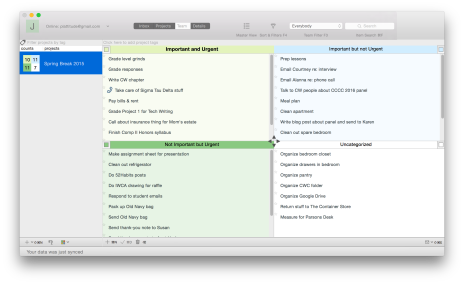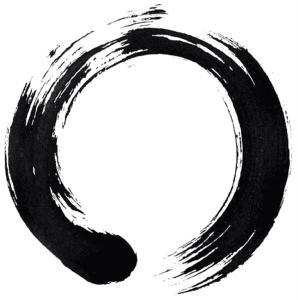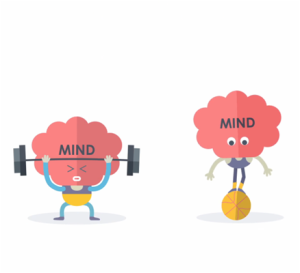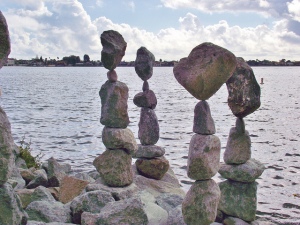The last few weeks have been a total failboat ride due to end-of-semester insanity. Thankfully, I have a mere 1.5 weeks until I can kiss this miserable academic year goodbye for good. So, much like the Spider-Man franchise, expect a reboot sooner than anyone expected.
Author: Julie Platt
Julie’s Week 13: A Credit Line at the Jerk Store
In the real world, being an overachiever is a fairly uncommon quality. Once leaving school, you might meet only a handful of overachievers in your lifetime. That’s not to say everyone else you meet is stupid; what it really means is that only a handful of people have chosen to measure themselves in adulthood with the same criteria children are defined by in school. It’s not bad. It’s just a really singular, specific system, only one among many, and many choose not to use it as their own personal measuring stick.
 In academia, however, being an overachiever is a necessity. In fact, it’s the lowest-common-denominator, the absolute minimum requirement one needs to have any hope of moving up from the basement level. Achievement becomes a race among elites, with status markers wholly unlike those used in the real world. In academia, you are only as good as your next publication, your next big scientific breakthrough, or your next grant money intake. It should come as no surprise, then, that the most common emotional state for academics is a volatile combination of fragile insecurity and overwhelming egotism. Twelve years after first entering academia as a 23-year-old MA student, this is certainly where I again find myself. Jealous. Whiny. Catty. Self-righteous and obnoxious. Panicky and despairing. My social media posts vacillate between smug humblebrags and sloppy goodbye-cruel-world vagueness. I am, well, a jerk.
In academia, however, being an overachiever is a necessity. In fact, it’s the lowest-common-denominator, the absolute minimum requirement one needs to have any hope of moving up from the basement level. Achievement becomes a race among elites, with status markers wholly unlike those used in the real world. In academia, you are only as good as your next publication, your next big scientific breakthrough, or your next grant money intake. It should come as no surprise, then, that the most common emotional state for academics is a volatile combination of fragile insecurity and overwhelming egotism. Twelve years after first entering academia as a 23-year-old MA student, this is certainly where I again find myself. Jealous. Whiny. Catty. Self-righteous and obnoxious. Panicky and despairing. My social media posts vacillate between smug humblebrags and sloppy goodbye-cruel-world vagueness. I am, well, a jerk.
Sudden family tragedy and conversations with old, pre-academia friends have brought my awareness of the real world back with a vengeance. I’m sick of myself, and of the way I’ve learned how to act over the years. I’ve been trying to step outside myself and watch how I act (especially at conferences), and I’m not impressed. I need to be less narcissistic, develop greater empathy, quit interrupting people, listen more. Thankfully, Lifehacker has some strategies for that. The tips for avoiding conversation narcissism seem particularly helpful for me, as I tend to always dominate conversations. So, to concretize my efforts, I’m going to try to do the following this week:
- Avoid talking about my favorite topics when in conversation with others. This seems absolutely key for me, as I often go off on conversational benders about particular things and suddenly everyone looks annoyed and bored.
- Ask those I speak with questions about what they think or feel. My normal response is to chime in about myself, even when I’m not trying to dominate the conversation. Instead, I’ll work on making questioning the default conversational strategy.
- Reflect at the end of the work day on the conversations I had and how I acted. I can’t improve unless I know where I’ve been and where I am now.
I’m sure this isn’t the only time this year I’ll work on being less of a jerk. Academic jerkhood is a pretty big and deep-seated problem, so I think I’ll need more passes at it later on. For now, checking my conversational style is a good place to start on this journey to stop overstocking the jerk store.
Rule 2: Prioritize Like Mad (Julie’s Spring Break Special)
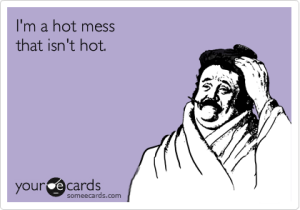 My parents were very clean, orderly people. When I say you could eat off of my mother’s floors, you pretty much could (you could probably eat off of the toilet seat too, but, you know, ew). I was expected to make my bed every single day, fold, hang, and put away my clothes, etc. I wouldn’t dare leave a dish in the sink or a sock on the floor. That just didn’t happen in the Platt household. But when I moved to Ohio and started living on my own, my 20+ years of (vaguely German) neatness training started to unravel. There were many reasons—rebellion, laziness, too much partying, and the insanity of the grad school schedule. To this day, I can tell when it’s nearly midterms because my apartment looks like a bomb hit it, and I’m not even in grad school anymore. I’m an actual adult. With an actual job. I turned 35 less than a week ago. AREN’T 35-YEAR-OLDS SUPPOSED TO HAVE THEIR SHIT TOGETHER???
My parents were very clean, orderly people. When I say you could eat off of my mother’s floors, you pretty much could (you could probably eat off of the toilet seat too, but, you know, ew). I was expected to make my bed every single day, fold, hang, and put away my clothes, etc. I wouldn’t dare leave a dish in the sink or a sock on the floor. That just didn’t happen in the Platt household. But when I moved to Ohio and started living on my own, my 20+ years of (vaguely German) neatness training started to unravel. There were many reasons—rebellion, laziness, too much partying, and the insanity of the grad school schedule. To this day, I can tell when it’s nearly midterms because my apartment looks like a bomb hit it, and I’m not even in grad school anymore. I’m an actual adult. With an actual job. I turned 35 less than a week ago. AREN’T 35-YEAR-OLDS SUPPOSED TO HAVE THEIR SHIT TOGETHER???- Bathed, dressed, and fed myself (bonus—put on makeup!)
- Made the bed
- Paid some more bills
- Finished a conference proposal
- Cleaned all the expired food out of the fridge
- Took out the trash
- Planned meals for the next 5 days
- Went grocery shopping
- Made two doctors appointments
- Prepped lessons for one of my two classes for next week
- Did my daily IWCA conference tweeting
- Wrote this shit right here again
Rule 1: Take Small Steps (Julie’s Spring Break Special)
 So, I made my list. You know, stuff that needed doing. I dove in, using the Getting Things Done strategy for listing every single thing that crossed my mind (every card to write, every phone call to make, every room to clean). I listed and listed. When dust settled, there were no less than fifty individual tasks on my “Spring Break 2015” to-do list.
So, I made my list. You know, stuff that needed doing. I dove in, using the Getting Things Done strategy for listing every single thing that crossed my mind (every card to write, every phone call to make, every room to clean). I listed and listed. When dust settled, there were no less than fifty individual tasks on my “Spring Break 2015” to-do list.- Bathed, dressed, and fed self
- Made bed
- Wrote a bunch thank-you notes and emails
- Paid bills
- Co-wrote a conference proposal
- Got two other conference proposals underway
- Got one of two inboxes to zero
- Delegated some service tasks
- Did my daily IWCA conference tweeting
- Wrote this shit right here
Julie’s Spring Break Special: A Week of Habits, Rebooted
- Take Small Steps: My small step today is to make a list of the things I want to accomplish in the next five days. Listing is something my mom always recommended I do whenever I got overwhelmed, and I still rely on it.
- Prioritize Like Mad: I don’t do this in any formal way, but I think I need to. Not every passive-aggressive work email needs to be dealt with right away.
- Pick One Thing and Finish It: Today I will finish my grading backlog. That’s daunting, but if I break it down into steps, I can do it.
- Make Health a Priority: For the last…I don’t know, twelve years? I’ve not done this, and my body has suffered horribly. How can I work effectively when I feel so awful?
Julie’s Week 9: Check Your Headspace
I have an unquiet mind.
I think the first time I realized this, I was trying to meditate with the guidance of a former partner who was a very devout Vajrayana Buddhist. I was sitting on a round meditation cushion, and my legs kept falling asleep while I tried to hold the prescribed posture. The minutes passed, and I couldn’t stop the thoughts from entering, and I couldn’t stop my mind from latching on and going for a ride on each one.
I don’t feel bad about my mind; Pema Chödrön herself, in one of her lectures, admitted to having an “unusually busy mind.” I’ve been reading Chödrön’s work, and the work of other Buddhist teachers and practitioners, since college. As I’ve moved away from the religion I was raised with (Roman Catholicism) and away from the others I’ve had brief dalliances with (Wicca/Paganism, Unitarianism, shamanic practices, etc.), I’ve found much of what I’ve come to believe is true echoed in Buddhism, specifically Zen. The unexpected passing of my mother has moved me to take my spirituality more seriously.
My first step is to begin a regular meditation practice. A little while ago, I purchased a subscription to Headspace, an app that offers guided mindfulness meditation programs that build skills incrementally. It also features focused sessions to help with things like sleep, creativity, and how to defuse anxiety in a crisis. I’m going to start the beginner’s “Take Ten” program at around 10:30 pm each evening. I’ll be meditating for ten minutes daily, at first, and then I’ll take up a more advanced program.
A famous quote attributed to His Holiness the 14th Dalai Lama goes as such: “Do not use Buddhism to become a Buddhist. Use Buddhism to become better at whatever else in your life you are doing already.” I’m going take this to heart. Here’s to the first small step in the journey to becoming a calmer, more gracious, and more compassionate person.
Julie’s Week 8: When Disaster Strikes…
Well, the last two weeks have been a mess. A slushy, icy mess. With a big frozen turd stuck directly in the middle.
- Get clean, in some way. Take a shower. Brush my teeth. Do the dishes, take out the trash, put in a load of laundry, pick up the stuff that’s not where it’s supposed to be and put it back.
- Get away from energy sucks. This includes avoiding social media for 12 to 24 hours. Anyone who knows me knows that social media can turn me into the absolute worst version of Julie Platt that is known to exist. I am aware of this. I am not proud of it. I can get away from it. I will.
- Pick an item on my to-do list that I have been avoiding, and do it. Pretty much the same as eating a frog (see Week 6).
- Pick a reward, and enjoy it. I’m in the process of making a list of rewards that don’t include spending money (see Week 5). A few I have so far: enjoy a beer, cook something good, take Dobson for a walk, play a game for 30 minutes.
- Listen to Allegra, Heather, and Katie’s HBIC playlist. I WOKE UP LIKE DIS
Julie’s Week 7: A Work-Work Balance
All work is the avoidance of harder work.” So says the American poet James Richardson in his famous book Vectors: Aphorisms & Ten-Second Essays. I’ve often paraphrased this quote—in sincerity and in jest—when talking for the millionth time about the workload that comes with a career in academia. Plenty of smart people have articulately described what it feels like to do this job; one of my more recent discoveries is Amanda Ann Klein’s “No End In Sight: Academic Research and ‘Time Off’”, in which Klein, considering what it would take to get to the status of full professor from associate, states “I came to the realization that the stress and late nights, the self doubt and loathing, were now unnecessary. I am not going to get a better-paying job and my current employers, no matter how many books I publish, how many students I mentor, or how many committees I serve on, are not going to give me any more money. Or at least not much money.” As I think about the way the academic labor force/market has changed, and how academia in general has changed, I know that what Klein is saying is more true than false.
Julie’s Week 6: Frog In My Throat, Delicious!
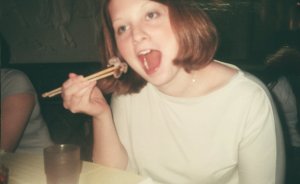
21-year-old me in Taiwan, May 2001, pretending to eat a raw baby octopus. It’s not a frog, but you get the idea.
So why, exactly, do I hate it? I think I’ve finally figured it out. It’s not because it’s tedious (although it definitely is that) and it’s not because I’m annoyed with my students for being lazy or careless (although that definitely comes in to play). I hate it because, for me, it’s where I have to face my own failures as a teacher. When I read a student draft that misses the mark completely, I blame myself for not teaching the student well enough. I second-guess all my lessons, and agonize over the things I must have done wrong. It’s painful. I hate it. Never mind that it’s not completely true, and that students are also partially responsible for their own learning (or their lack thereof). I am the worst teacher ever and I suck, and this subpar writing is the proof. So, I leave all the grading work to the very last minute, and even beyond that last minute.
Julie’s 52 Habits Update
Julie’s Week 5: Dollar Dollar Bills, Y’all
Let’s talk about money.
When I graduated from college in 2002, I landed a salaried job–with benefits–within a month (this is now and kinda was then pretty much unheard of). I was living with my parents, who were so thrilled that their English-major kid found a job that they didn’t charge rent. So, apart from my car payment and cell phone bill, I was free to spend my modest salary on clothes, cocktails, and lunches from the Whole Foods salad bar. I was out on Match.com dates until 2 and got to work by 8 the next morning, was in CardioKick by 5:30 and charging kitten-heel flats in Banana Republic at 7 with a sack of takeout Thai food waiting in the car. In short, I finally had some money, and I thought I was hot shit.
Guess how much money I saved during this magical time? Guess how much I could have saved? When I was in grad school and trying to make it to loan disbursement while overdrawing my bank account and paying bills late, I cursed my stupid decisions. The ivory pantsuit was $200 I could never get back, and it ended up in the donation pile (because it seemed I packed on about 75 pounds with every subsequent degree I earned). I guess it wouldn’t have mattered a lot, now that I see how puny my savings would have been compared to ten years of adulthood below the poverty line while desperately trying to appear professional. By the end of my Ph.D., I had accumulated a terrifying amount of credit card debt (and let’s not even talk about student loans). When I got my first academic job (the one I’m still at), I hoped I could get ahead of my bills, but my disappointingly tiny paychecks (yet another issue in academia) vaporized on contact with my expenses and my debt.
And lest you think I’m in denial: I know that all of this is at least 50% my fault. In addition to food, I exchange my feelings of sadness, anger, and fear for stuff: clothing, makeup, jewelry, shoes, home decor, electronics…the list goes on. I justify this with excuses: I work so hard! I never get to go anywhere. I miss my family. I hate my body/apartment/car/life. It’s been a rough day/week/month. I must look like such a loser compared to XYZ, they have a job and a house and a family and a retirement plan…The worst excuse of all was/is this: It doesn’t matter. This is how I pretend that a slip-up is not actually a slip-up, and that I’ll get it together perfectly tomorrow. Then I wonder why months have passed and I’ve seen no progress.
And then there’s this other thing that happened. On September 21, 2014, my mother died. She was a few months short of retirement and her 66th birthday. It was unexpected and sudden, and horrific and unfair and cruel and surreal. And, without sharing too many private details, I’ll say that in the weeks and months that followed my credit card debt became a thing of the past and I found myself with some substantial assets. And although I would joyfully give up my newfound financial security to have my mom back…it’s not going to happen. So, I try to tell myself that this was mom’s way of helping me, one last time.
That brings me to the present moment. I need a damn budget, now that I actually have enough money to cover my expenses. So, naturally, I’m using the personal finance software You Need A Budget. It helps you create and stick to a budget and gives you access to free online money management classes. At $60, it’s steep, but I got a deal on my copy several months ago. My goal is to have a basic monthly budget planned by the end of Week 5. Also, I’m emptying my Sephora and Ulta and Old Navy online shopping carts, because the reward points ain’t all that.
Julie’s 52 Habits Update
Week 4: Not too shabby with these daily pomodori. I’m doing 20-minute intervals with 5-minute breaks, and I’ve found that the Pomodoro Timer app is highly customizable and can track whether or not I’ve met my goals. Also, what this is helping me to do is prioritize writing. I could have spent the last hour doing more class prep or grading, but I pushed all of that aside to write (even if it is just a blog post—you gotta start somewhere). I’ll be no good to anyone, least of all my students, if I can’t get anything published and lose my job or something.
Week 3: Still holding steady at getting ready immediately upon waking, but haven’t done anything since then. I’ll make it my goal to spend some time planning my ideal bedtime routine this week.
Week 2: I’ve been avoiding the scale as last weekend’s mega-depression drove me to the proverbial feed bag. However, I made some tasty paleo dishes this week, including a respectable chicken tikka and paleo naan, and a wicked good pad Thai with zucchini strands in place of the rice noodles.
Week 1: I’m getting close to making 2 daily distraction-free hours an actual, bona fide habit. When I don’t do it, I feel weird. Yay!
